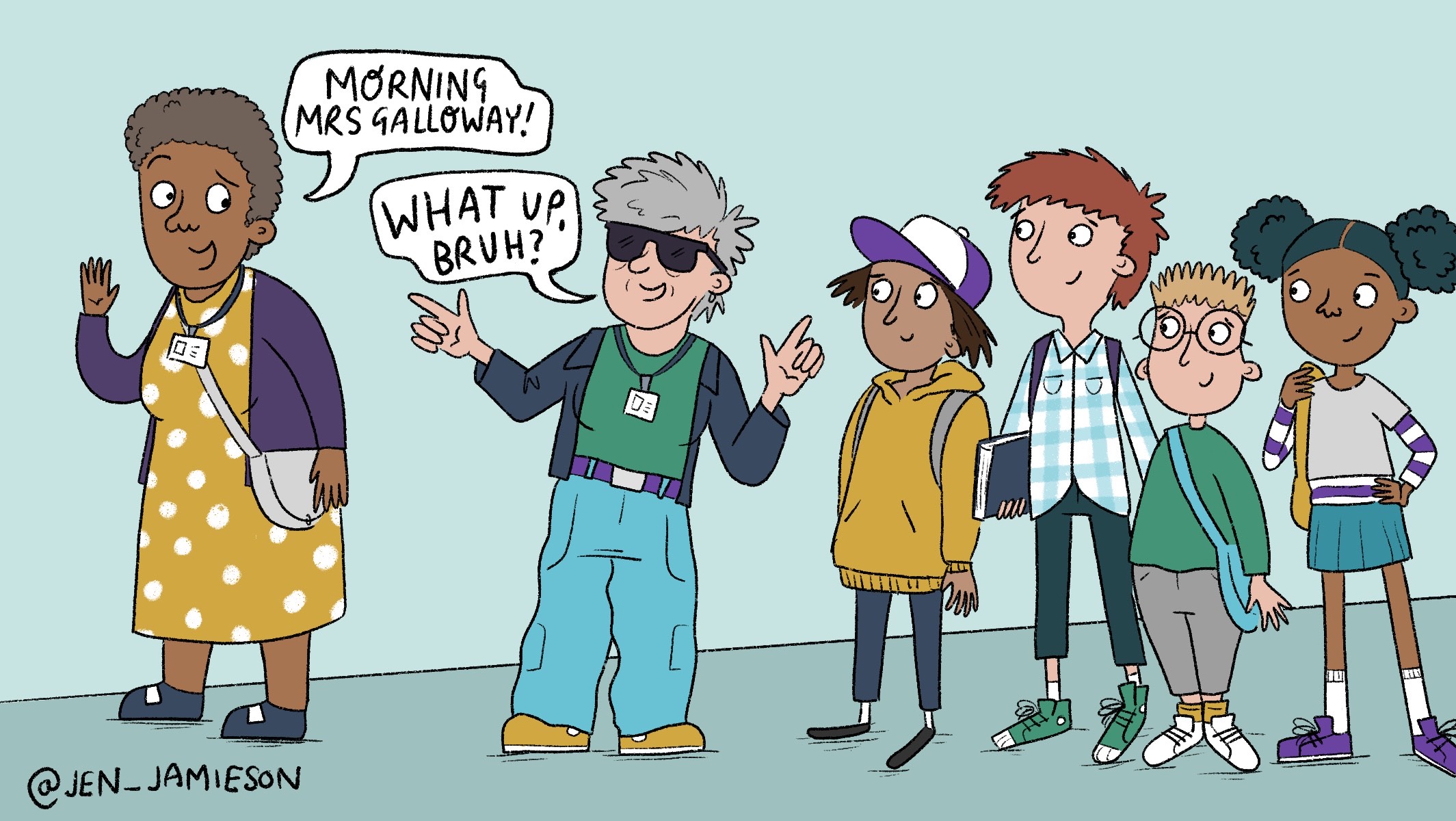Help! My Coworker Acts Like She’s One of the Students


Dear We Are Teachers,
I’m part of a new teacher cohort that started together this year at my school, all teaching 9th grade. One of the teachers in my cohort is weirdly friendly with students. She has organized several group dinners and group hangouts with students—all at public locations or restaurants, but still. Plus, when our cohort gets together, she tells us all kinds of gossip the students tell her. It all makes me feel uncomfortable, but I can’t decide if this is normal and I’m overreacting or if this is inappropriate for a teacher. What do you think?
—Act Your Age
Dear A.Y.A.,
*Waves red flag* This situation is a big NOPE for me. While I value building relationships with students outside the classroom, the safest way is through school-sanctioned activities like sports, school clubs, etc. Of course, we occasionally see students outside of these confines—I live on an island … so it happens—but we need to ensure clear boundaries that keep everyone safe.
Even if the outings were school-sanctioned, it’s unacceptable to share the students’ gossip. It’s inappropriate and makes everyone uncomfortable! Be direct: When she shares student gossip, say, “It makes me feel really uncomfortable talking about our students like this. Let’s change topics.” If she keeps pushing, say you want to protect yourself, your job, and your peace, and leave. Hopefully, others do the same, but even if they don’t, it’s worth protecting your integrity.
It’s also worth mentioning that, depending on state laws, educators are often mandated reporters. This fact means if the “gossip” shared has any indication a student is at risk in some way, whoever heard it must report it. If you haven’t learned about your obligations as a mandated reporter, ask your HR department or an administrator to help you understand your role. This choice may mean sharing information your coworker has told you, but transparency is a necessary part of student safety.
If these outings are not school-sanctioned, you need to say something. If you have a close relationship with this teacher, share your concerns: You want her to create and manage healthy boundaries with students. Note that someone—including yourself—might tell HR. You know this situation isn’t good. Regardless of friendship, you should follow your instinct to protect students, yourself, and your friend (even if she’s not protecting herself). Even if she agrees to stop, encourage her to tell an administrator—and do so yourself—to cover your bases.
If you’re not close, you don’t want to have that conversation with her, or you have the slightest inkling something else inappropriate happened, go straight to an administrator. This situation must be discussed. Yet, discussing appropriateness with her is an administrator’s job, as they are in a position to redirect her. Hopefully, she’ll listen.
No matter what, speak up. I know these conversations can be challenging, but you don’t want to regret not speaking up now.
Good luck, and I am sending lots of support, bravery, and care!
Dear We Are Teachers,
I run a gardening program at a private high school that’s labeled an “after-school sport.” One of my students is considered a jock. He played every sport during fall and winter but chose to do gardening in the spring. He absolutely loves it and is such a pleasure to have in my class. He told me he loves the tranquility of the garden. Today, he told me some coaches have pressured him to leave gardening to play lacrosse instead. He’s not interested and expressed how brutal lacrosse is. Should I confront these coaches?
—The Joy of Gardening
Dear T.J.O.G.,
I appreciate how much you want to advocate for your student. It’s exciting to hear this student has found peace and joy in a new activity. Regardless of what happens with sports and coaching, I hope you keep telling this student how much you appreciate him in the garden. That positive feedback will continue to make him feel welcome and allow him to feel supported as he looks into activities he may not have previously considered.
What you do next is dependent on one key factor: the student. I would ask the student if he would like you to support him directly. If he says no, respect that trust. The student is already opening up and perhaps being vulnerable by taking on a new activity, and while this situation is essential, it’s not worth breaking trust. Instead, you can continue to support the student from the sidelines. This support ensures they have a safe space in the garden.
If the student would like you to advocate for them, I’d uplift their voice as much as possible. The student should lead the conversation with your support. Can you help them draft an email or plan what they want to say to their coaches? Can you help them discuss this with their family? This situation is an essential opportunity for students to learn how to advocate for themselves. Hopefully, you provide moral support and context that can help them express their ideas.
No matter what, I hope the garden remains a safe, joyful space. Perhaps this is a good opportunity for you to advocate for your garden curriculum on a larger scale so that other members of the school community see how valuable gardening is and are more supportive of students. Thank you for your important work.
Dear We Are Teachers,
My district gave us “intent to return” forms in January to let the administration know our plans for the next school year. I decided I would not return to my current school for both family and professional reasons, so I said I’d be seeking employment in a different school/district. My principal emailed me to confirm, saying it’s important they know to begin hiring right away. I confirmed I would not be returning. Now, I’m gathering letters of recommendation for other applications. I emailed her for a letter about three weeks ago, and she never responded. I feel that no response is unprofessional, especially after I was respectful enough to be truthful about my intentions for next year. Should I meet with her and clarify? I have to use her as my current supervisor on applications, and I’m concerned she’s out to sabotage my future opportunities.
—Job Hunting
Dear J.H.,
Good luck with your job search. I appreciate your willingness to be transparent. While some might say that you shouldn’t let your administration know you’re leaving until you’ve got a new offer, I often find that difficult since schools or districts may want to reach out to your supervisor. It’s better if they hear it from you than from a reference call.
I would see your administrator in person but try not to accuse them of anything. Instead, I’d just check in and ask if they need anything from you to write the letter. While it may feel disrespectful not to respond, that may not have been their intention (I imagine they get a lot of emails). That doesn’t mean your feelings aren’t valid—I’d feel frustrated too—but it’s not worth getting into it since you’re already leaving. It sounds like you have generally been OK with this administrator, so I’d secure your recommendation and go on good terms.
Additionally, you can see if someone else, like a department or grade-level chair, can write a letter of recommendation for you. This can make sure that, even if your administrator is less than helpful, future employers can get a more well-rounded picture of your work.
Do you have a burning question? Email us at askweareteachers@weareteachers.com.
Dear We Are Teachers,
I’m in my first year of teaching 8th grade math. So far, these are the days I’ve had either a walk-through or classroom observations: Halloween (which fell on a Friday), the Friday before we let out for Thanksgiving, and one of the half days we had before school let out before winter break when my students were already done with my final exam. Each time, I’ve gotten feedback that my students were rowdy and my lesson wasn’t rigorous enough. Is my admin trolling me on purpose? Or should I gently point out to them that I keep being observed on the literal worst days of the school calendar?
—Observation Blues
Source link




